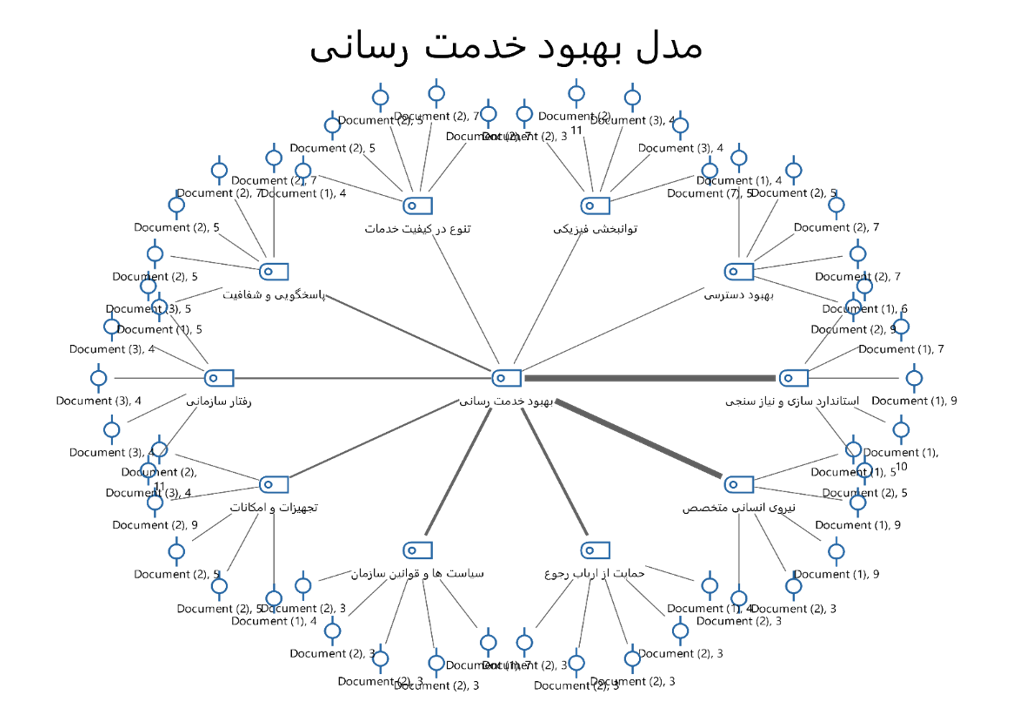Presenting an Optimization Model for Organizational Culture in the Social Security Organization
Keywords:
culture optimization, social security, organizational culture, service improvementAbstract
This study presents an optimization model for organizational culture in the Social Security Organization. In this qualitative research, necessary competencies for managers and employees are identified through in-depth interviews with managers of the Social Security Organization to examine critical factors in changing organizational culture and improving service delivery. The research field and the qualitative statistical population include experts, managers, scholars, and high-ranking employees in the Social Security Organization. The total number of managers in the central building of the Social Security Organization amounts to 23 individuals. The analysis and examination of the relationship between components and indicators of organizational culture change and improved service delivery were conducted using Grounded Theory (GT) and the qualitative software Maxqda. Results indicate that organizational culture, with an emphasis on developmentalism, structure, hierarchy, teamwork, and quantitative and qualitative growth, promises improvements in ethics, customs, and traditions of society and enhances the market for techniques and skills. Accordingly, the importance and application of a developmental culture in the Social Security Organization, where human resources play the most critical role, are essential.
Downloads
References
Bartoli J. The Effects of Company Culture on Company Profitability. 2021.
Walker B, Soule SA. Changing company culture requires a movement, not a mandate. Harvard Business Review.
Wills C, Bates K, Frost NA, Monteiro CE. Barriers to help-seeking among correction officers: Examining the
influence of institutional culture and structure. Criminal Justice Studies. 2021;34(4):423-40. doi:
1080/1478601X.2021.1997276.
Bagga SK, Gera S, Haque SN. The mediating role of organizational culture: Transformational leadership and change
management in virtual teams. Asia Pacific Management Review. 2022.
Potokar T, Bendell R, Phuyal K, Dhital A, Karim E, Falder S, Price PE. The development of the Delivery Assessment
Tool (DAT) to facilitate quality improvement in burns services in low-middle income countries. Burns. 2022;48(6):1488-96.
doi: 10.1016/j.burns.2021.10.010.
Purwanto A. The Impacts of Leadership and Culture on Work Performance in Service Company and Innovative Work
Behavior as Mediating Effects. Journal of Research in Business, Economics, and Education. 2020.
Yan K, Li G, Cheng TCE. The impact of service-oriented organizational design factors on firm performance: The
moderating role of service-oriented corporate culture. International Journal of Production Economics. 2020;228:107745. doi:
1016/j.ijpe.2020.107745.
Ng F, Townsend ML, Jewell M, Marceau EM, Grenyer BF. Priorities for service improvement in personality disorder
in Australia: perspectives of consumers, carers and clinicians. Personality and Mental Health. 2020;14(4):350-60. doi:
1002/pmh.1485.
Shier ML, Turpin A, Nicholas DB, Graham JR. Dynamics of a culture of workplace safety in human service
organizations: A qualitative analysis. International Social Work. 2019;62(6):1561-74. doi: 10.1177/0020872819858744.
Jia Y, Fu H, Gao J, Dai J, Zheng P. The roles of health culture and physical environment in workplace health
promotion: a two-year prospective intervention study in China. BMC Public Health. 2018;18:1-10. doi: 10.1186/s12889-018-
-5.
Lee T. Process safety management: optimized models influenced by organization culture. 2018.
Doregard M, editor Studying and examining the relationship between organizational culture and the level of readiness
for change in employees. The Third International Conference on New Ideas in Management, Accounting, Economics and
Banking; 2022.
Namvar M, Rahimi M, editors. Examining the effects of citizenship education on changing the behavior of citizens
and its role in promoting citizenship culture. 9th International Conference on Modern Researches in Civil Engineering,
Architecture, Urban Management, and Environment; 2022.
Azhdari A, Yazdan Moghadam J, Kargar Shurki M, Moslamipour M, editors. Investigating the impact of
organizational culture development on the implementation of the change model with regard to the mediating role of the support
of senior managers. The 18th International Management Conference; 2021.
Mousavi Naini SM, Rostami Mal Khalifa R, Sarshar S, editors. Investigating the relationship between organizational
culture and organizational change with regard to the mediating role of organizational agility. The First International Conference
on Educational Sciences, Psychology, Sports Sciences, and Physical Education; 2021.
Moghadasi A, Divandari S, Manochehri N, editors. A study on the challenges and process of organizational culture
change. The 11th National Conference on Management and Human Sciences Research in Iran; 2021.
Fallah A, Karimi Taher R, Shaiste Tabakh G, editors. Presenting the integration model of the supply chain of medical
equipment and its impact on improving health-oriented services; A case study of a hospital in Tehran2018.
Baird K, Su S, Tung A. Organizational culture and environmental activity management. Business Strategy and the
Environment. 2018;27(3):403-14. doi: 10.1002/bse.2006.
Betsch C, Böhm R, Airhihenbuwa CO, Butler R, Chapman GB, Haase N, Uskul AK. Improving medical decision
making and health promotion through culture-sensitive health communication: an agenda for science and practice. Medical
Decision Making. 2016;36(7):811-33. doi: 10.1177/0272989X15600434.

Downloads
Published
Submitted
Revised
Accepted
Issue
Section
License
Copyright (c) 2024 Journal of Study and Innovation in Education and Development

This work is licensed under a Creative Commons Attribution-NonCommercial 4.0 International License.










